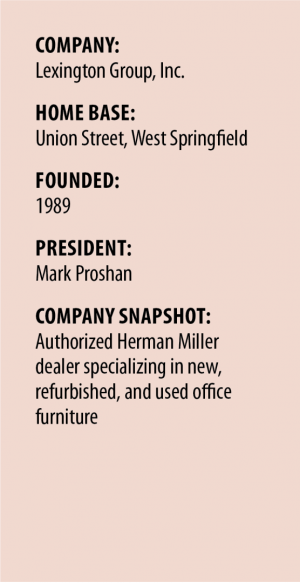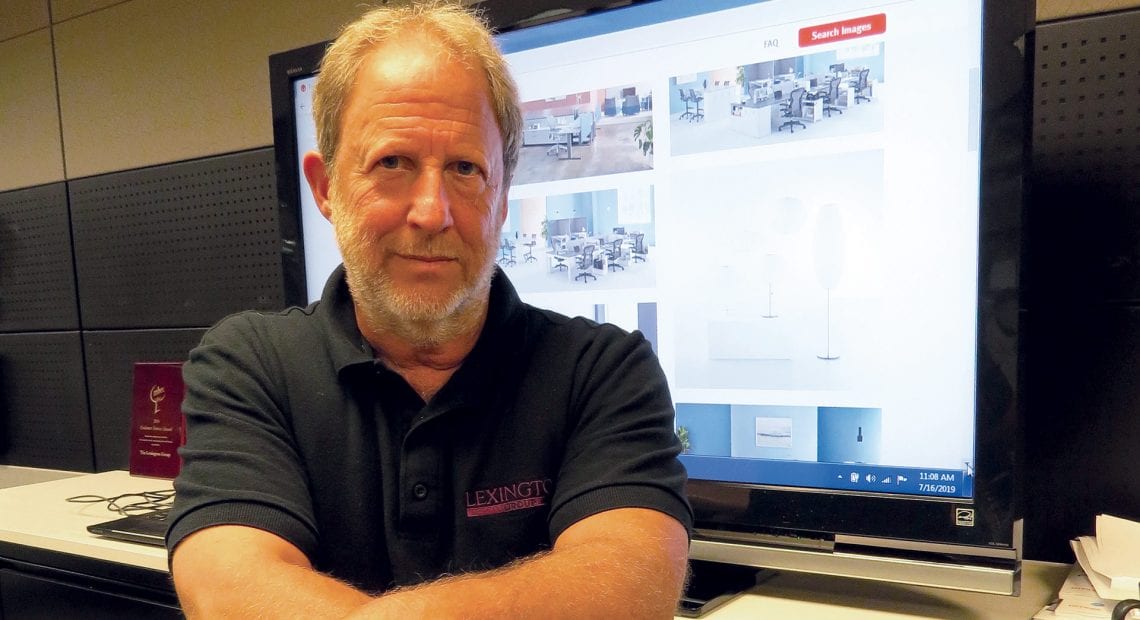They’re Not Sitting Still
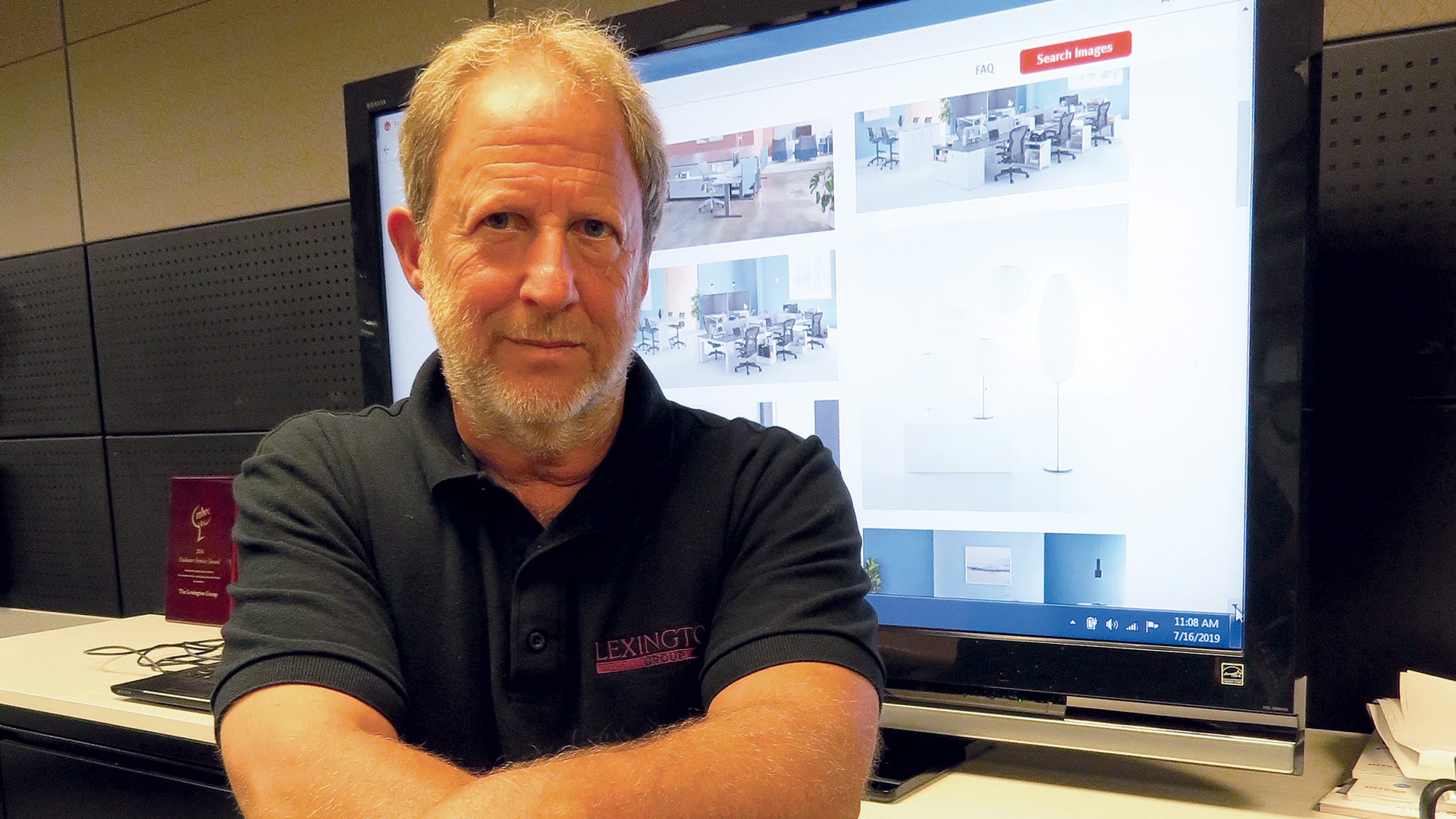
Mark Proshan
When the Lexington Group was launched in the waning days of the 1980s, the office was in many ways a different place than it is today. Spaces are more open, people can now stand at their desks, and the ‘world of sitting’ has evolved in ways that might not have been imagined years ago. As it celebrates 30 years in operation, the Lexington Group embraces change, but really embraces what hasn’t changed — the basic fundamentals of serving customers.
It’s been not quite 30 years since the collapsing Monarch Insurance Co. handed employee Mark Proshan an additional assignment — find a buyer for roughly $3.5 million in office furniture it no longer needed — one that ended with him becoming that buyer.
With that acquisition, he founded the Lexington Group, which, now as then, operates out of former manufacturing space in the old Gilbarco complex on Union Street in West Springfield, selling and repairing new and used office furniture.
As he talked with BusinessWest about those 30 years, Proshan noted two things that might seem obvious. The first is that they’ve gone by very quickly. The second is that they have been marked by constant and sometimes profound change.
Indeed, Proshan now regularly attends ergonomics conferences — there weren’t many, if any, of those in 1989. He sells sit-stand desks and something called the Magis Spun chair (it’s large, orange, looks more like a sculpture than a chair, and, yes, it rocks and spins; it’s popular in college dorm lounges). And today, rather than browse the showroom (although some still do that), many customers come in with a cell phone and show Proshan a picture of what they want. They weren’t doing that in 1989, either.
But what’s far more significant to him — not that these changes are not noteworthy — is what hasn’t changed.
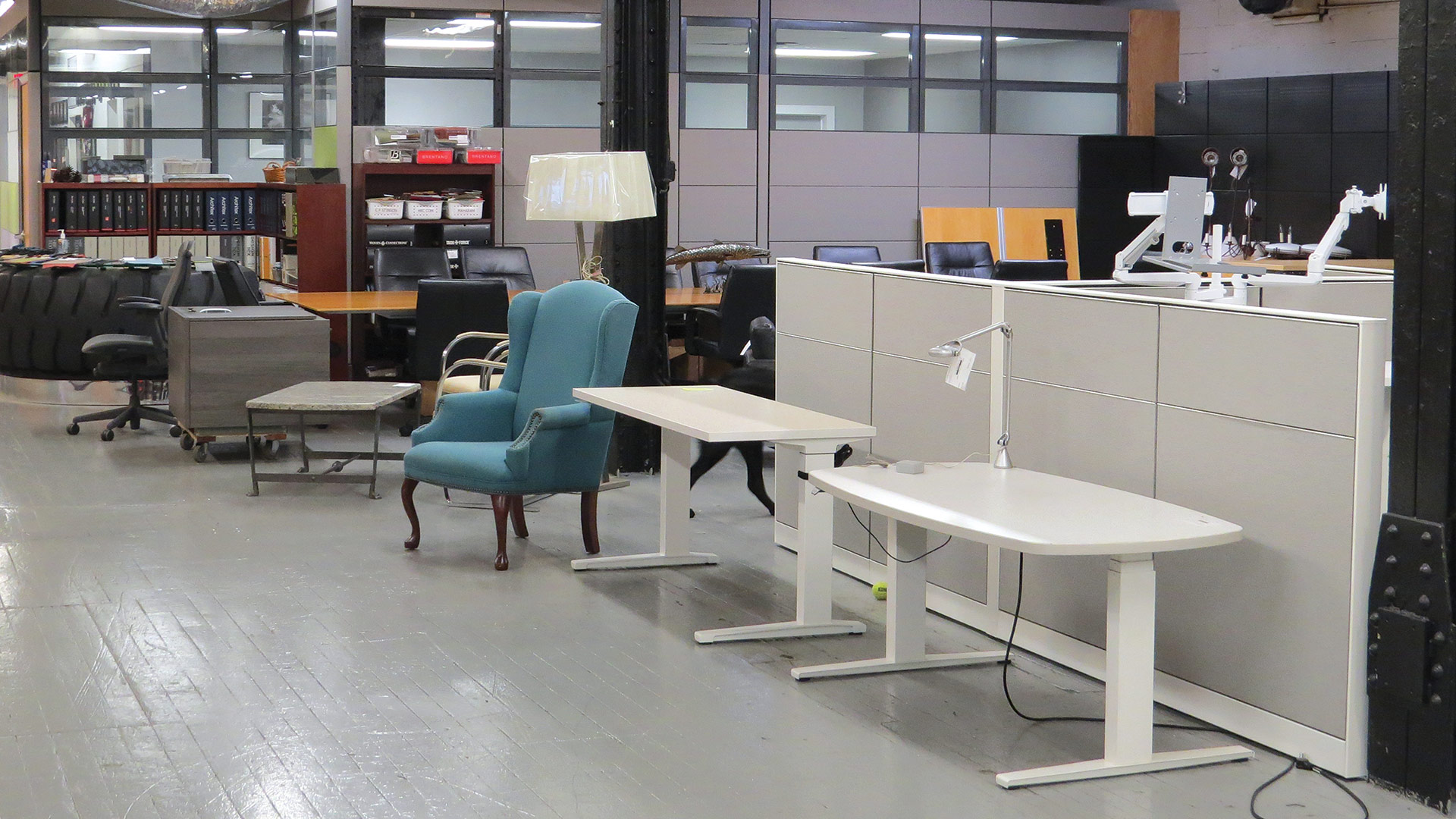
Mark Proshan says there have been many changes in the inventory on the showroom floor over the past 30 years, but what’s more important is what hasn’t changed — the fundamentals of business.
“The fundamentals of doing business have never changed, in my opinion,” he told BusinessWest. “The technology and the gadgetry and the wizardry of doing business have changed, but the need to listen, establish relationships, understand, and guide someone to what would be a good solution for them — those don’t change, and that’s what we’ve always done.”
This focus on listening, guiding, and relationship building has enabled Lexington Group to enjoy consistent growth over the years, to the point where it now occupies roughly 165,000 square feet, more than eight times the amount it struggled to fill with inventory when it first opened, and employs 30 people full-time, as opposed to the two part-timers Proshan started with.
Change, as noted, has been a constant when it comes to everything from products to how people shop to the height of cubicle walls (they were 70 inches on average, and now they’re typically 48 to 54). Meanwhile, the percentage of used furniture sold compared to new, which was roughly 60-40, is now the exact opposite, and probably closer to 20-80 as customer demands change.
The client list has changed and grown as well, said Proshan, adding that it includes many of the region’s colleges and universities, hundreds of businesses large and small, and a growing number of entrepreneurs launching new ventures.
These are just some of the things the company is celebrating as it marks this important milestone, with the official anniversary date coming in December.
It will celebrate in unique style well before that, though, with an event that’s been staged in most other markets before, but not this one, to the best of Proshan’s knowledge.
We’re talking about chair hockey.
Yes, this is hockey played in chairs — specifically Aeron Chairs manufactured by Herman Miller, a company that has been helping to stage such competitions across the country and around the world. In fact, the phrase often used is Aeron hockey.
Set for Oct. 2 at Lexington’s facilities — the center aisle in the main showroom is 30 feet wide, ample enough for such a purpose — this event will feature top collegiate teams squaring off, with the winner moving on to play a delegation from the Springfield Thunderbirds. A contingent from American International College, which last spring sent a team deep into the NCAA tournament, has signed on, as has UMass Amherst, which went all the way to the championship game last spring (won by Minnesota-Duluth) to participate as well.
“The technology and the gadgetry and the wizardry of doing business have changed, but the need to listen, establish relationships, understand, and guide someone to what would be a good solution for them — those don’t change, and that’s what we’ve always done.”
Proceeds — and Proshan is hoping to raise $5,000 to $7,000 — will go to the Foundation for TJO Animals.
Funds will be raised by selling Aeron chairs to be used in the tournament to participating companies (at an amount well below sticker price). Companies get their name on the back of the chair for the tournament, and when it’s over, they get to keep the chair.
Ultimately, Proshan is hoping this becomes an annual event, and he has ambitions to take it to a larger venue (the MassMutual Center, perhaps) and involve dozens of area businesses in the competition.
“We’re excited about this because a lot of people do walks, a lot of people do runs, and a lot of people do golf tournaments, but this has never been done before,” he said, adding that this year’s hockey competition doubles (or triples) as an anniversary celebration and networking event for the region.
And it’s an appropriate way to mark the company’s milestone because it represents something new, different, and forward-looking, qualities the company has strived to embody from the very beginning.
Chair Man
As he talked about his business and his industry, Proshan acknowledged what many probably knew already: office furniture is not exactly rocket science.
But it is certainly more than filling a warehouse with desks, chairs, file cabinets, and credenzas and waiting, as he noted, for people to come in, bring their phones out, and show pictures of what they want. This is, indeed, a customer-service-focused business, even if the customer might not fully grasp this at the beginning.
“With office furniture, people will often come in thinking that they know what they want,” he said. “But when you question them as to why, they start to look at things differently.”
To get his point across, Proshan summoned one of the myriad anecdotes he’s collected over three decades as a business owner.
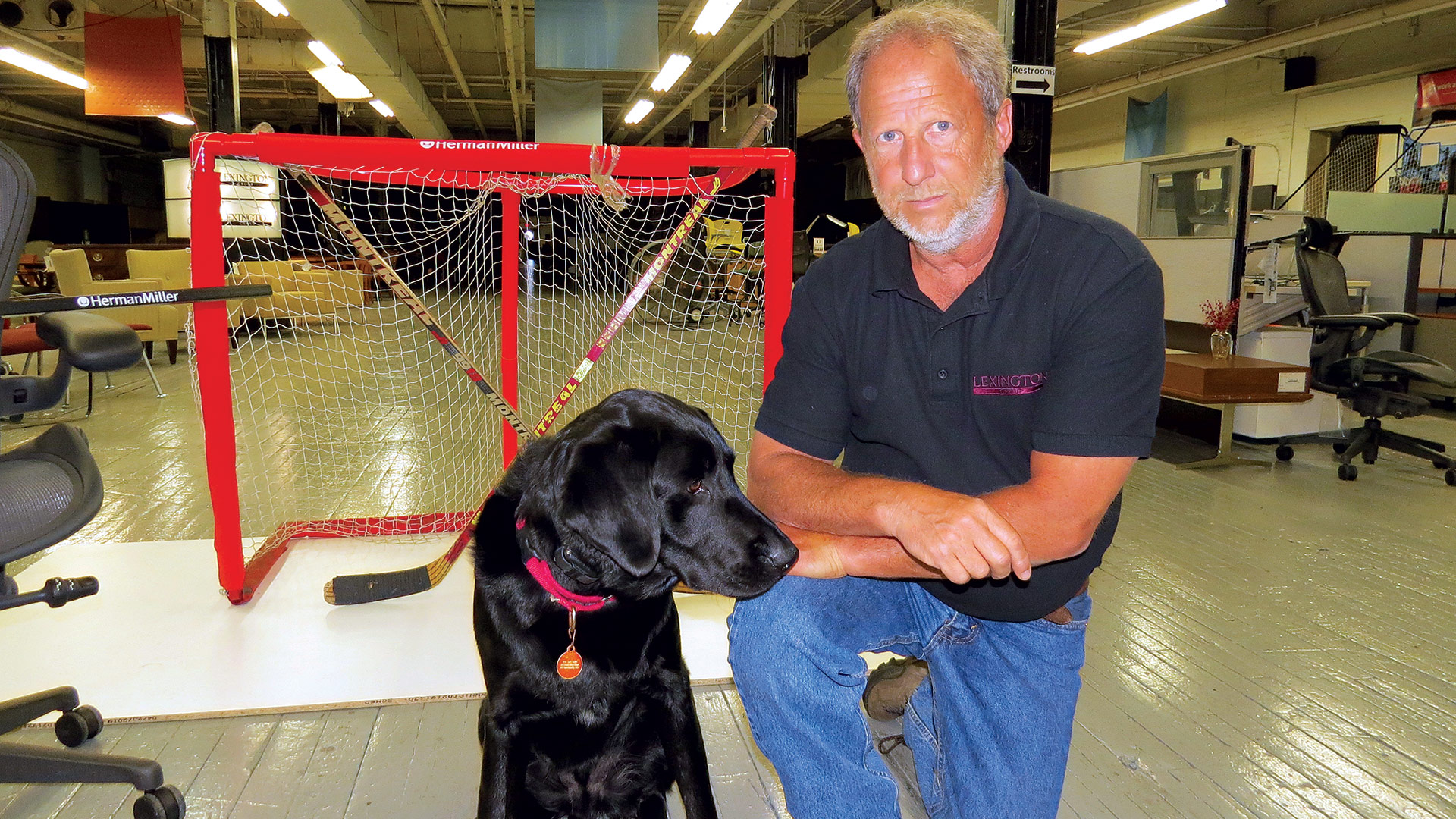
Mark Proshan, seen here with his dog and frequent work companion, Beckett, says the company will celebrate 30 years with an Aeron hockey competition.
“A guy came in a few years ago, and he wanted a very traditional, bank-like-looking leather chair to sit at his desk in,” Proshan recalled. “It had all of the looks of old-school banking and power, and that’s what he wanted. And when I talked with him, he said he was also having trouble with his back.
“I told him this chair would do nothing to help with any physical ailments he was experiencing, and also told him I understood what he was going for in terms of a look,” he went on. “But I told him he needed to weigh that against the benefits of some of the technological advancements that have come out in the world of sitting.”
Fast-forwarding a little, Proshan said he showed the customer an Aeron chair, and the response was “absolutely not — this is not what I have in mind.” He then enticed him to sit in one. When the customer left the showroom, he took one of the chairs with him.
That story provides a simple yet effective tutorial in how this business is carried out, or should be carried out.
“It’s that kind of guiding people to what may be a more favorable outcome that they may not have been aware of when they came in that still takes place,” he said. “And that’s really the key to success in this business.”
Meanwhile, that story also provides more evidence of how things have changed.
Exhibit A is that phrase Proshan used above — ‘the world of sitting.’ It has changed considerably in 30 years, and even in the past few years. And, as noted with that reference to the sit-stand desks now populating the workplace (Proshan has one himself), people are doing less of it.
But when they do sit … well, there are options, more of them than some might imagine.
Like the Magis Spun chair, made by Herman Miller and described in marketing materials as “a fun and functional chair that lets you rock side to side or spin around.” And like the Berdi Perchiching sit-stand stool, made by Ergonomic Solutions. As the name suggests, it’s designed for use with sit-stand desks, and, further, it’s designed to enable people to exercise their core while sitting and working.
Proshan, who also has one of these, explains, with insight gathered at one of those ergonomics conferences he now attends:
“The experts say that not only should we stand, but we should be constantly engaging our hips and our core,” he said, referring to the now-universally accepted opinion that people need to sit less. “And I have a chair with a bottom that moves so that you constantly engage the hips and your core and are more active than if you were just standing.”
As for the aforementioned height of cubicle walls, and the more-open nature of today’s offices, a topic of considerable import in this business, Proshan won’t predict anything, but he said he’s heard anecdotally that they may be soon be rising again.
“Things seem to cycle, and there’s a question about how long it will be before the walls go back up and people want their private and individual spaces again,” he told BusinessWest. “And that’s good news if you’re in this industry, because then you’ll have an opportunity to provide product in that new design mode.”
He added that it’s not his job to predict what will come, but to be ready for it, and to help customers be ready for it. And that’s another thing that hasn’t changed since he put a sign over his door.
Bottom Line
Returning to the question of what has changed and what hasn’t in 30 years, Proshan said his office provides ample evidence of the former, between his desk and his ergonomically correct chair.
As for the latter, he goes back to his comments about the fundamentals of business — and his in particular.
“The basics of office furniture haven’t changed that much in a very long time,” he said. “There’s a place to sit, a place to stand, and a place to collaborate. It’s not that dynamic.
“It’s still about the fundamentals — paying attention to who your customers are and what they’re asking you to do, and being there when they need you to be there,” he went on. “Those are the things that are constants, and they’re as important now as they were back then.”
A sharp focus on those fundamentals has helped Lexington Group grow and thrive through three decades of change to the so-called ‘modern office,’ and this is what will carry it through the next chapters in its intriguing history.
George O’Brien can be reached at [email protected]
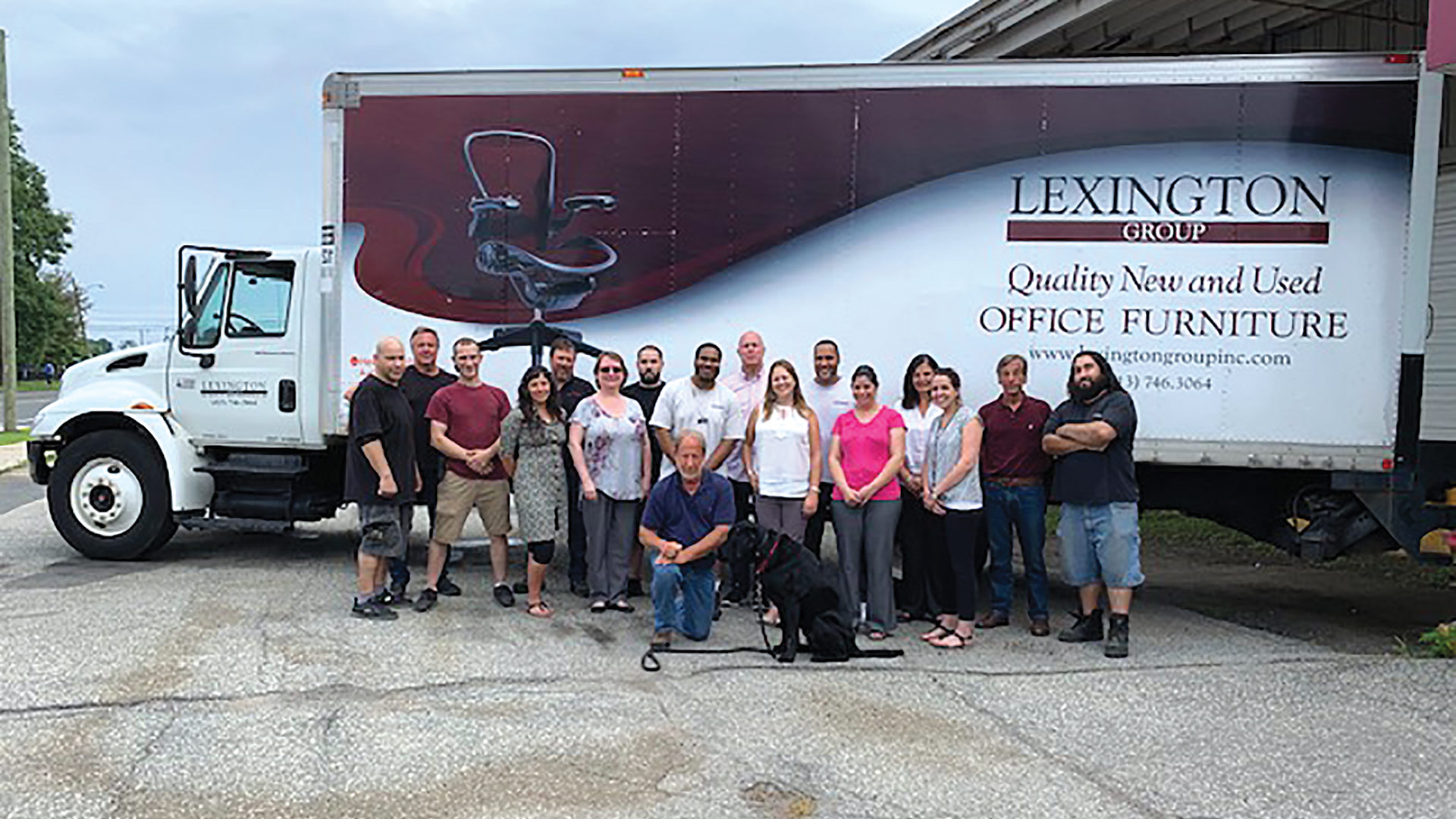
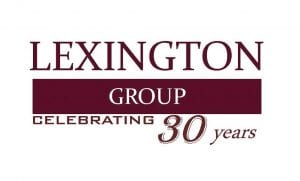 “They’re akin to Medieval torture devices — it’s like sitting on a rock,” he joked. “The evolution of the chair has been quite dramatic, but then … these days, we’re telling everyone to stand up, not sit down.”
“They’re akin to Medieval torture devices — it’s like sitting on a rock,” he joked. “The evolution of the chair has been quite dramatic, but then … these days, we’re telling everyone to stand up, not sit down.”